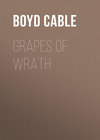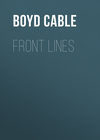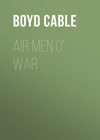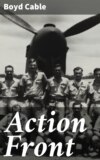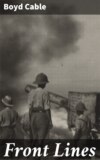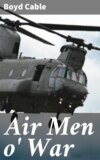Read the book: «Grapes of wrath», page 11
CHAPTER XV
CASUALTIES
A deep and comparatively uninjured German dug-out had been adapted for use as a dressing-station. Its entrance lay in a little cup-shaped depression with a steep, sloping bank behind it, and the position of this bank and the entrance opening out of it away from the British lines had probably been the saving of it from shell fire. Kentucky groped his way down the dark stairway, and the bearers followed with Pug on the stretcher. The stair was horribly steep, built in high and narrow wooden steps which were coated with thick, slippery mud, and it was with some difficulty that the stretcher was brought down. The stair opened out direct into a large, well-built dug-out with planked floor, walls and roof, and beyond it again a narrow passage led to a further room, also well built and plank lined, but much longer, and so narrow that it barely gave room for men to be laid across it. This chamber, too, was filled with wounded, some of them stretched at full length, others squatting close packed about the floor. The first room was used by the doctors, because, being more widely built, it gave room for a couple of tables. There were three doctors there, two working at the tables, the third amongst the cases huddled along the wall. Kentucky took his place, leaning back against the wall and waiting his turn, but Pug was carried almost at once to one of the tables.
“Have you heard anything about how the whole show is going?” Kentucky asked one of the orderlies. “Not a word,” said the man. “Leastways, we’ve heard so many words you can’t believe any of ’em. Some o’ the casualties tells us one thing an’ some another. But we’ve bumped the Hun back a lump, that’s sure. They all tell us that.”
Kentucky stayed there some minutes longer, waiting his turn and watching the doctors at their work. They were kept hard at it. The casualties came stumbling down the stair in an unbroken procession, and in turn passed along to the doctors at the tables. Most of those that walked had bandages about their heads, faces, hands, or arms; most of them were smeared and spattered with blood, all of them were plastered thick with mud. Many had sleeves slit open or shirts cut away, and jackets slung loosely over their shoulders, and as they moved glimpses of white flesh and patches of bandage showed vividly fresh and clean behind the torn covering of blood-stained and muddy khaki. As fast as the doctor finished one man another took his place, and without an instant’s pause the doctor washed from his mind the effort of thought concentrated on the last case, pounced on the newcomer, and, hurriedly stripping off the bandages, plunged into the problem of the fresh case, examining, diagnosing, and labeling it, cleansing the wound of the clotted blood and mud that clung about it, redressing and bandaging it. Then each man’s breast was bared and a hypodermic injection of “anti-tetanus” serum made, and the man passed along to join the others waiting to go back to the ambulances. And before he was well clear of the table the doctor had turned and was busied about the next case. The work went on at top speed, as smooth as sweet-running machinery, as fast and efficiently as the sorting and packing of goods in a warehouse by a well-drilled and expert staff. It was curiously like the handling of merchandise, if you gave your main attention to the figures passing down the stairs, moving into line up to the tables, halting there a few minutes, moving on again and away. The men might have been parcels shifting one by one up to the packers’ tables and away from them, or those pieces of metal in a factory which trickle up leisurely to a whirling lathe, are seized by it, turned, poked, spun about with feverish haste for a minute by the machine, pushed out clear to resume their leisured progress while the machine jumps on the next piece and works its ordered will upon it. That was the impression if one watched the men filing up to and away from the doctor’s hands. It was quite different if attention were concentrated on the doctor alone and the case he handled. That brought instant realization of the human side, the high skill of the swiftly moving fingers, the perfection of knowledge that directed them, the second-cutting haste with which a bandage was stripped off, the tenderness that over-rode the haste as the raw wound and quivering flesh were bared, the sure, unhesitating touch that handled the wound with a maximum of speed finely adjusted to a minimum of hurt, the knowledge that saw in one swift glance what was to be done, the technical skill, instant, exact, and undeviating, that did it. Here, too, was another human side in the men who moved forward one by one into the strong lamp-light to be handled and dealt with, to hear maybe and pretend not to heed the verdict that meant a remaining life to be spent in crippled incompetence, in bed-ridden helplessness; or a sentence that left nothing of hope, that reduced to bare hours in the semi-dark of underground, of cold and damp, of lonely thoughts, the life of a man who a few hours before had been crammed with health and strength and vitality, overflowing with animal fitness and energy. With all these men it appeared to be a point of honor to show nothing of flinching from pain or from fear of the future. All at least bore the pain grimly and stoically, most bore it cheerfully, looked a detached sort of interest at their uncovered wounds, spoke with the doctor lightly or even jestingly. If it was a slight wound there was usually a great anxiety to know if it would be “a Blighty one”; if it were serious, the anxiety was still there, but studiously hidden under an assumed carelessness, and the questioning would be as to whether “it would have to come off” or “is there a chance for me?”
When Kentucky’s turn came he moved forward and sat himself on a low box beside the table, and before he was well seated the orderly was slipping off the jacket thrown over his shoulders and buttoned across his chest. The doctor was in his shirt-sleeves, and a dew of perspiration beaded his forehead and shone damp on his face and throat. “Shell, sir,” said Kentucky in answer to the quick question as the doctor began rapidly to unwind the bandages on his shoulder. “Dropped in a shell hole next the one I was lying in with another man. That’s him,” and he nodded to where Pug lay on the other doctor’s table. “He’s hurt much worse than me. He’s a particular chum of mine, sir, and – would you mind, sir? – if you could ask the other doctor he might tell me what Pug’s chances are.”
“We’ll see,” said the doctor. “But I’m afraid you’ve got a nasty hand here yourself,” as he carefully unwound the last of the bandage from Kentucky’s fingers and gently pulled away the blood-clotted pad from them. “Yes, sir,” agreed Kentucky. “But, you see, Pug got it in the leg, and the bearers say that’s smashed to flinders, and he’s plugged full of other holes as well. I’m rather anxious about him, sir; and if you could ask…”
“Presently,” said the doctor, and went on with his work. “What was your job before the war? Will it cripple you seriously to lose that hand; because I’m afraid they’ll have to amputate when you go down.”
Kentucky was anxiously watching the men at the other table and trying to catch a glimpse of what they were doing. “It doesn’t matter so much about that, sir,” he said: “and I’m a lot more worried about Pug. He’ll lose a leg if he loses anything, and mebbe he mightn’t pull through. Couldn’t you just have a look at him yourself, sir?”
As it happened, his doctor was called over a minute later to a hurried consultation at the other table. The two doctors conferred hastily, and then Kentucky’s doctor came back to finish his bandaging.
“Bad,” he said at once in answer to Kentucky’s look. “Very bad. Doubtful if it is worth giving him a place in the ambulance. But he has a faint chance. We’ll send him down later – when there’s room – if he lasts… There you are … now the anti-tetanic…” busying himself with the needle “… and off you go to Blighty.”
“Thank you, sir,” said Kentucky. “And can I stay beside Pug till it’s time to move?”
“Yes,” said the doctor. “But I’m afraid we’ll have to let you walk if you can manage it. There’s desperately little room in the ambulances.”
“I can walk all right, sir,” said Kentucky; and presently, with a label tied to the breast of his jacket, moved aside to wait for Pug’s removal from the table. They brought him over presently and carried him into the other room and laid him down there close to the foot of another stair leading to above-ground. Kentucky squatted beside him and leaned over the stretcher. “Are you awake, Pug?” he said softly, and immediately Pug’s eyes opened. “Hullo, Kentuck,” he said cheerfully. “Yes, I’m awake orright. They wanted to gimme another dose o’ that sleep stuff in there, but I tole ’em I wasn’t feelin’ these holes hurt a bit. I wanted to ’ave a talk to you, y’see, ol’ man, an’ didn’t know if another pill ’ud let me.”
“Sure they don’t hurt much?” said Kentucky.
“No,” said Pug; “but it looks like a wash-out for me, Kentuck.”
“Never believe it, boy,” said Kentucky, forcing a gayety that was the last thing he actually felt. “We’re going down and over to Blighty together.”
Pug grinned up at him. “No kid stakes, Kentuck,” he said; “or mebbe you don’t know. But I ’eard wot them M.O.s was sayin’, though they didn’t know I did. They said it wasn’t worth sendin’ me out to the ambulance. You knows wot that means as well as me, Kentuck.”
Kentucky was silent. He knew only too well what it meant. Where every stretcher and every place in the ambulances is the precious means of conveyance back to the doctors, and hospitals, and the hope of their saving of the many men who have a chance of that saving, no stretcher and no place dare be wasted to carry back a dying man, merely that he may die in another place. The ones that may be saved take precedence, and those that are considered hopeless must wait until a slackening of the rush allows them to be sent. In one way it may seem cruel, but in the other and larger way it is the more humane and merciful.
“There’s always a chance, Pug,” said Kentucky, striving to capture hope himself. “Course there is,” said Pug. “An’ you can bet I’m goin’ to fight it out an’ cheat them doctors if it can be done, Kentuck. You’ll go down ahead o’ me, but there ain’t so many casualties comin’ in now, an’ the battalion bein’ on the way out will leave less to be casualtied an’ more room on the amb’lance. You keep a lookout for me, Kentuck. I might be down at the boat as soon as you yet.”
“That’s the talk, boy,” said Kentucky. A man hobbling on a stick came in from the doctors’ room, and, seeing Kentucky, picked his way over the outstretched forms to him. “Hello, Kentuck,” he said. “You got your packet passed out to you, then. An’ you, too, Pug?” as he caught sight of Pug’s face half-hidden in bandages.
“Cheer-oh, Jimmy,” said Pug. “Yes, gave me my little sooven-eer all right. An’ the worst of it is I’m afraid they’ve made a mess o’ my fatal beauty.”
“Never min’, Pug,” said Jimmy, chuckling and seating himself beside the stretcher. “I see they’ve lef’ your ’andsome boko in action an’ fully efficient.”
“Wot’s yours?” said Pug with interest. “Oh, nothin’ much,” said the other. “Bit of shrap through the foot. Just good enough for Blighty, an’ nothin’ else to fuss about. How far did you get?”
Pug tried to tell his story, but in spite of himself his voice weakened and slurred, and Kentucky, catching Jimmy’s eye, placed his finger on his lips and nodded significantly towards Pug. Jimmy took the hint promptly. “Hullo, some more o’ the old crush over there,” he said. “I must go’n ’ave a chin-wag with ’em,” and he moved off.
“D’you think you could find me a drink, Kentuck?” said Pug; and Kentucky went and got some from an orderly and brought it and held it to the hot lips. After that he made Pug lie quiet, telling him he was sure it was bad for him to be talking; and because the drug still had a certain amount of hold perhaps, Pug half-drowsed and woke and drowsed again. And each time he woke Kentucky spoke quietly and cheerfully to him, and lied calmly, saying it wasn’t time for him to go yet – although many others had gone and Kentucky had deliberately missed his turn to go for the sake of remaining beside the broken lad. Most of the walking cases went on at once or in company with stretcher parties, but Kentucky let them go and waited on, hour after hour. His own arm and hand were throbbing painfully, and he was feeling cold and sick and deadly tired. He was not sleepy, and this apparently was unusual, for most of the men there, if their pain was not too great, lay or sat and slept the moment they had the chance. Although many went, the room was always full, because others came as fast. The place was lit by a couple of hanging lamps, and blue wreaths of cigarette smoke curled and floated up past their chimneys and drifted up the stairway. Kentucky sat almost opposite the stair, and the lamplight shone on the steps and on the figures that disappeared up it one by one, their legs and feet tramping up after their heads and bodies had passed out of vision. The ground above had evidently been churned into thin mud, and the water from this ran down the stair, and a solid mass of the thicker mud followed gradually and overflowed step by step under the trampling feet. For an hour Kentucky watched it coming lower and lower, and thought disgustedly of the moment when it would reach the floor and be tramped and spread out over it, thick and slimy and filthy. His back began to ache, and the tiredness to grip and numb him, and his thoughts turned with intolerable longing to the moment when he would get off his mud-encrusted clothes and lie in a clean hospital bed. Every now and then some orderlies and bearers clumped down the stair into the dug-out, and after a little stir of preparation a batch of the wounded would walk or be helped or carried up out into the open to start their journey back to the ambulances. But the cleared space they left quickly filled again with the steady inflow of men who came from the doctors’ hands in the other room, and these in their turn settled themselves to wait their turn squatting along the walls or lying patiently on their stretchers. They were all plastered and daubed with wet mud and clay, worn and drooping with pain and fatigue; but all who had a spark of consciousness or energy left were most amazingly cheerful and contented. They smoked cigarettes and exchanged experiences and opinions, and all were most anxious to find out something of how “the show” had gone. It was extraordinary how little they each appeared to know of the fight they had taken such an active part in, how ignorant they were of how well or ill the action had gone as a whole. Some talked very positively, but were promptly questioned or contradicted by others just as positive; others confessed blank ignorance of everything except that they themselves had stayed in some ditch for a certain number of hours, or that the battalion had been “held up” by machine-gun fire; or that the shelling had been “hell.” “But if I’d ’a’ had to ha’ choosed,” said one, “I’d ha’ sooner been under their shell-fire than ours. The Bosche trenches in front o’ us was just blowed out by the roots.”
“Never seed no Bosche trenches myself,” said another. “I dodged along outer one shell-hole inter another for a bit an’ couldn’t see a thing for smoke. An’ then I copped it and crawled back in an’ out more shell-holes. Only dash thing I’ve seed o’ this battle has been shell-holes an’ smoke.”
“Anyways,” put in a man with a bandaged jaw, mumblingly, “if we didn’t see much we heard plenty. I didn’t think a man’s bloomin’ ears would ’ave ’eld so much row at onct.”
“We got heaps an’ heaps o’ prisoners,” said a man from his stretcher. “I saw that much. We muster took a good bit o’ ground to get what I saw myself o’ them.”
“Hadn’t took much where I was,” remarked another. “I didn’t stir out of the trench we occupied till a crump blew me out in a heap.”
“Did any o’ you see them Tanks? Lumme, wasn’t they a fair treat?..”
Talk of the Tanks spread over all the dug-out. It was plain that they were the feature of the battle. Every man who had seen them had wonder tales to tell; every man who had not seen was thirsting for information from the others. The Tanks were one huge joke. Their actual services were overshadowed by their humor. They drew endless comparisons and similes; the dug-out rippled with laughter and chucklings over their appearance, their uncouth antics and – primest jest of all – the numbers their guns had cut down, the attempts of the Germans to bolt from them, the speed and certainty with which a gust of their machine-gun fire had caught a hustling mob of fugitives, hailed through them, tumbled them in kicking, slaughtered heaps.
In the midst of the talk a sudden heavy crash sounded outside and set the dug-out quivering. A couple more followed, and a few men came down the stairs and stood crowded together on its lower steps and about its foot.
“Pitchin’ ’em pretty close,” one of these informed the dug-out. “Too close for comfort. An’ there’s about a dozen chaps lyin’ on top there waitin’ for stretchers.”
Immediately there followed another tremendous crash that set the dug-out rocking like a boat struck by a heavy wave. From above came a confused shouting, and the men on the stair surged back and down a step, while earth fragments rattled and pattered down after them.
In the dug-out some of the men cursed and others laughed and thanked their stars – and the Bosche diggers of the dug-out – that they were so deep under cover. The next shells fell further away, but since the Germans of course knew the exact location of the dug-out, there was every prospect of more close shooting.
Efforts were concentrated on clearing the wounded who lay at the top of the stair in the open and as many of the occupants of the dug-out as possible.
But Kentucky managed to resist or evade being turned out and held his place in the shadows at Pug’s head, sat there still and quiet and watched the others come one by one and pass out in batches. And each time Pug stirred and spoke, “You there, Kentuck? Ain’t it time you was gone?” told him, “Not yet, boy. Presently.” And he noticed with a pang that each time Pug spoke his voice was fainter and weaker. He spoke to an orderly at last, and the doctor came and made a quick examination. With his finger still on Pug’s wrist he looked up at Kentucky and slightly shook his head and spoke in a low tone. “Nothing to be done,” he said, and rose and passed to where he could do something.
“Kentuck,” said Pug very weakly; “collar hold o’ that Germ ’elmet o’ mine. I got no one at ’ome to send it to … an’ I’d like you to ’av it, chummy … for a sooven-eer … o’ an ol’ pal.” Kentucky with an effort steadied his voice and stooped and whispered for a minute. He could just catch a faint answer, “I’m orright, chum. I ain’t afeard none …” and then after a long pause, “Don’t you worry ’bout me. I’m orright.” And that was his last word.
Kentucky passed up the stair and out into the cold air heavily and almost reluctantly. Even although he could do nothing more, he hated leaving Pug; but room was precious in the dug-out, and the orderlies urged him to be off. He joined a party of several other “walking cases” and a couple of men on stretchers, and with them struck off across the battlefield towards the point on the road which was the nearest the ambulance could approach to the dressing station. The Germans had begun to shell again, and several “crumps” fell near the dug-out. Kentucky, with his mind busied in thoughts of Pug, hardly heeded, but the others of the party expressed an anxiety and showed a nervousness greater than Kentucky had ever noticed before. The explanation was simple, and was voiced by one cheerful casualty on a stretcher. “I’ve got my dose, an’ I’m bound for Blighty,” he said, “an’ gels chuckin’ flowers in the ambulance in Lunnon. If you bloomin’ bearers goes cartin’ me into the way o’ stoppin’ another one – strewth, I’ll come back an’ ’aunt yer. I’ve ’ad the physic, an’ I don’t want to go missin’ none o’ the jam.”
They moved slowly across the torn fields and down along the slope towards the road. In the valley they walked in thin, filmy mists, and further on, where low hills rose out of the hollow, camp fires twinkled and winked in scores on the hillsides. And still further, when they rounded a low shoulder and the valley and the hills beyond opened wide to them, the fires increased from scores to hundreds. “Bloomin’ Crystal Palis on firework night,” said one man, and “Why don’t the special constables make ’em draw the blinds an’ shade the lights?” said another.
Kentucky saw these things, heard the men’s talk, without noting them; and yet the impression must have been deeper and sharper than he knew, for there came a day when he recalled every spot of light and blot of shadow, every curve of hill and mist-shrouded valley, every word and smothered groan and rough jest and laugh, as clearly as if they had been in his eyes and ears a minute before. In the same detached way he saw the bodies of men lying stiff in grotesque, twisted postures or in the peaceful attitudes of quiet sleep, the crawling mists and the lanterns of orderlies and stretcher-bearers searching the field for any still living, heard the weak quavering calls that came out of the mists at intervals like the lonely cries of sheep lost on a mountain crag, the thin, long-drawn “He-e-e-lp” of men too sore stricken to move, calling to guide the rescuers they knew would be seeking them. And in the same fashion, after they came to the ambulances waiting on the broken roadside and he had been helped to the seat beside the driver of one, he noticed how slowly and carefully the man drove and twisted in and out dodging the shell holes; noticed, without then realizing their significance, the legions of men who tramped silently and stolidly, or whistling and singing and blowing on mouth-organs, on their way up to the firing line, the faces emerging white and the rifles glinting out of the darkness into the brightness of the headlights. The car made a wide detour by a road which ran over a portion of ground captured from the Germans a few weeks before. A cold gray light was creeping in before they cleared this ground that already was a swarming hive of British troops, and further than the faint light showed, Kentucky could see and sense parked ranks of wagons, lines of horses, packed camps of men and rows of bivouacs. From there and for miles back the car crept slowly past gun positions and batteries beyond count or reckoning, jolted across the metals of a railway line that was already running into the captured ground, past “dump” after “dump” of ammunition, big shells and little piled in stacks and house-high pyramids, patches of ground floored acre-wide with trench mortar bombs like big footballs, familiar gray boxes of grenades and rifle cartridges, shells again, and yet more shells. “Don’t look like we expected to ever lose any o’ this ground again,” said the driver cheerfully, and Kentucky realized – then and afterwards – just how little it looked like it, and quoted softly to himself, from the Battle Hymn again – “He has sounded forth the trumpet that shall never call retreat.” As the light grew and the car passed back to where the road was less damaged or better repaired their speed increased and they ran spattering in the roadside to meet more long columns of men with the brown rifle barrels sloped and swaying evenly above the yellow ranks – ”… a fiery gospel writ in rows of burnished steel,” murmured Kentucky. “Wot say?” questioned the driver. “Nothing,” said Kentucky. “That’s the clearin’ station ahead there,” said the driver. “You’ll soon be tucked up safe in a bed now, or pushin’ on to the ambulance train and a straight run ’ome to Blighty.”
So Kentucky came out of the battle, and stepping down from the ambulance, with an alert orderly attentive at his elbow to help him, took the first step into the swift stages of the journey home, and the long vista of kindness, gentleness, and thoughtful care for which the hospital service is only another name. From here he had nothing to do but sleep, eat, and get well. He was done with battle, and quit of the firing line. But as he came away the war had one more word for his ear, and as he was carried on board the hospital train, the distant guns growled and muttered their last same message to him – “grapes of wrath, of wrath, of wrath.”
And after he had lost the last dull rumble of the guns he still bore the memory of their message with him, carried it down to the edge of France, and across the Narrow Seas, and into the sheltered calm of England.
He had been strangely impressed by the fitting of his half-forgotten verses to all he had come through, and their chance but clear coincidence worked oddly on him, and came in the end to be a vital influence in picking the path of his immediate future and leading it utterly away from other plans.
